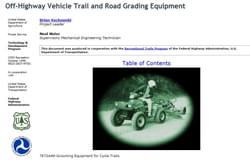




The Missoula Technology and Development Center (MTDC) was asked to find a good way to maintain a 40-mile (64-k) motorcycle and all-terrain-vehicle (ATV) trail on the Francis Marion National Forest in coastal South Carolina. Heavy use leaves a washboard surface that progresses to mounds and gullies several feet across. These are called "whoop-de-doos," and trail users find them both unpleasant and unsafe.
by USDA Forest Service, Federal Highway Administration

The Missoula Technology and Development Center (MTDC) was asked to find a good way to maintain a 40-mile (64-k) motorcycle and all-terrain-vehicle (ATV) trail on the Francis Marion National Forest in coastal South Carolina. Heavy use leaves a washboard surface that progresses to mounds and gullies several feet across. These are called "whoop-de-doos," and trail users find them both unpleasant and unsafe.
The problem of whoop-de-doos is not unique to this trail in the sandy coastal plain of South Carolina. We began the project by asking off-highway vehicle (OHV) trail managers throughout the Forest Service how they were maintaining their OHV trails. Several National Forests had developed prototype lightweight graders that could be towed behind ATV's, effectively removing whoop-de-doos with routine maintenance. MTDC worked with two of these Forests to further improve and evaluate these prototypes, tested them in South Carolina, and looked to the open market for similar equipment.
This report focuses on three pieces of equipment tested in South Carolina: a modified trail rock rake suggested by Cam Lockwood on the Angeles National Forest, CA; a trail drag designed by Dick Dufourd and Kim Larsen for use on the Deschutes National Forest, OR; and an Ultra Light Terrain Grader manufactured by The Shop Industrial, Lively, Ontario, Canada.
Innovations in Mechanized Trailbuilding
posted Feb 19, 2018
Cutting edge machinery for building recreational trails.
Stock-Drawn Equipment for Trail Work
posted Jan 24, 2018
Locating replacement parts for the stock-drawn hillside plows of yesteryear.
1,735 views • posted 06/11/2018